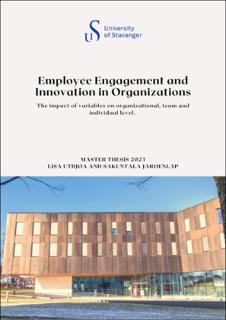| dc.description.abstract | This thesis examines the relationship between the dependent variables' employee engagement and innovation, focusing on various antecedent variables. The primary objective of this study is to explore the relationship between employee engagement and innovation and how the variables influence each other. Additionally, the thesis seeks to determine the extent to which organizational factors (transformational leadership, autonomy, and job demand), team factors (age discrimination and innovation climate), and individual factors (work-life balance, weekly working hours, gender and age, and organizational factors) predict employee engagement and innovation in organizations. Moreover, the study examines whether these relationships remain consistent when predicting employee engagement and innovation across the three levels.
The data used in this study is gathered through surveys with a quantitative research method. The data sample consisted of a representative sample of Norwegian employees, and in that way, providing a diverse perspective on the topic. Furthermore, to ensure the data's quality, various statistical methods were used to evaluate the reliability, validity, and correlations between variables. The reliability and validity of the measuring scales used were evaluated using factor analysis. The relationships between the chosen variables were also investigated using Pearson's bivariate correlation analysis. Lastly, multiple hierarchical regression analyses were employed to explore the relationships between the independent and dependent variables.
The results highlight several key findings at all three levels. At the organizational level, TL, autonomy, and special competence job demands were significant predictors of employee engagement and innovation. Organizations that exhibit transformational leadership behaviors, give employees autonomy, and provide job demands that align with their specialized skills and abilities are more likely to experience higher engagement and innovative contributions. The study reveals the importance of an innovation climate at the team level in promoting employee engagement and innovation. A positive innovation climate encourages employees' innovativeness, leading to increased engagement. Furthermore, at the individual level, work- life balance significantly influences both variables. However, contrary to prior research, the findings indicate that a lower work-life balance fosters higher levels of employee engagement and innovation. This study contributes to a deeper understanding of the complex relationship between all three levels in shaping employee engagement and innovation. | |
